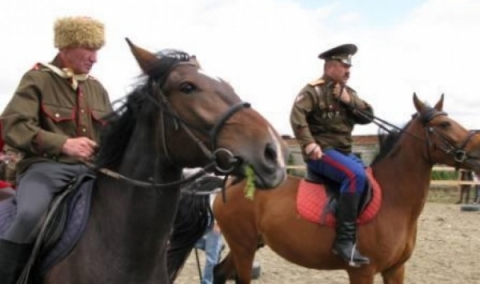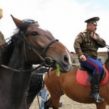
Moving Central Asian Cossacks to North Caucasus Threatens Russians and Non-Russians Alike
Publication: Eurasia Daily Monitor Volume: 10 Issue: 222
By:

A proposal by a Russian church leader in Stavropol to resettle the Semirechye Cossacks, who are seeking to move from Kazakhstan and Kyrgyzstan, to the North Caucasus has several damaging implications. Such a policy not only threatens to exacerbate ethnic conflicts in Russia’s troubled southern region but also add to efforts by Cossacks to secure official recognition of their community as a nation, something that other Russian churchmen have said could lead to the same official status for Siberians and thus destroy the Russian Federation.
Last week, Metropolitan Kirill of Stavropol and Nevinnomyssk and chairman of the Synod’s Cossack affairs committee, called for the authorities to arrange for the resettlement of the descendants of the Semirechye Cossacks of Central Asia in the North Caucasus to help maintain order there (nazaccent.ru/content/9946-mitropolit-kirill-poprosil-minregion-vklyuchit-skfo.html). But there are reasons to think that his proposal, if realized, is likely to create more problems than it will solve.
The Semirechye Cossacks were established as a separate voisko (host) only in 1864. Earlier they had been part of the Siberian voisko. They were involved both in heavy fighting against Central Asians in the course of the Russian conquest of that region and in acts of suppression of the local population up to the end of Imperial times. During the Russian civil war (1917–1922), they fought for the Whites against both the Bolsheviks and local nationalists. After that conflict, some fled abroad where they were absorbed by other émigré voiskos or were suppressed by the Soviets as part of the brutal “de-Cossackization” campaigns of the 1920s. Throughout its history and far more than most other Cossack voiskos, the Semirechye Cossack community was known for its Russian nationalism and opposition to Turkic Muslim groups (Richard Longworth, The Cossacks, 1970).
The antagonism of the Semirechye Cossacks to Muslim groups was, a century ago, far more marked than negative attitudes toward them among the Don, Kuban and Terek Cossacks who have a long history in the North Caucasus and have, in many cases, developed relatively good ties with non-Russian groups. One cannot extrapolate the values held a century ago to today’s groups, but the historical records promoted by each of the 11 different voiskos suggest a great variety of views. It is thus likely, if not certain, that the more anti-Muslim views of the Semirechye Cossacks in the past will be reflected in their descendents and those who have identified with them. And to the extent that is the case, those values could lead them to have quite particular patterns of interaction with non-Russians there (Richard Longworth, The Cossacks, 1970).
Despite this, Metropolitan Kirill said that moving the Semirechye Cossacks into Stavropol would “give a good impulse” to the development of stability in this majority ethnic-Russian North Caucasian krai. Russian officials are backing him up, viewing Kirill’s suggestion as a valuable refinement of their plans to put Cossack units of various voiskos into non-Russian border regions, including Buryatia and the Jewish Autonomous oblast (themoscowtimes.com/news/article/government-proposes-opening-up-north-caucasus-for-returning-russians/491020.html).
But there is another way in which the Orthodox hierarch’s proposal may have unintended consequences. Cossack groups in the North Caucasus have long sought, and recently achieved at the regional level, official recognition of their community as a nation rather than just a social stratum. Such recognition would give them the opportunity to demand the restoration of their territories under existing Russian law, something that the arrival in the North Caucasus of Cossacks from another voisko would both make more likely and more dangerous given that the Semirechye Cossacks have no historical links with that region.
Many Russians are also concerned that any recognition of the Cossacks as a nation, however justified the Cossacks may believe it is, would become the basis for other regional groups such as the Siberians to do the same. A couple weeks ago (November 28), the youth club of the World Russian Popular Assembly issued a declaration saying that Cossacks are part and parcel of the Russian nation and must not be viewed as a separate nation lest others within the Russian nation do the same (vrns.ru/news/2323/#.Up33vuJcUUM).
“Cossacks,” the group said, “always were in the avant-garde of the defense of Russia’s borderlands and guards of Russian statehood and the sovereignty of the country.” Because of their special way of life, “it is completely natural” that some of them developed “special worldviews” and “a unique psychology.” According to the group, “this tendency appeared, among other occasions, during [World War II] when the Nazi invaders, having temporarily occupied Cossack lands, tried to attract the Cossacks to their side and to convince them that the Cossacks are a separate ethnos and not part of the Russian people.”
The club said that it was especially concerned that such efforts are continuing and that they have the support of certain Russian academicians. “In front of our eyes, the unity of the Russian people is being artificially divided, and precedents are being created for analogous decisions” about Siberians, Uraltsy, and Muscovites.” Moving the Semirechye Cossacks to the North Caucasus will only accelerate this process.




